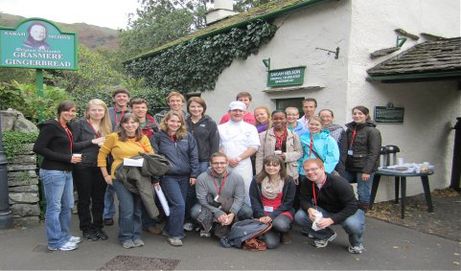
Dr Gordon Johnson hands over the role of Provost of the Gates Cambridge Trust at a welcome dinner for new scholars tonight.
New Gates scholars arriving at Cambridge will be welcomed at an official dinner given by the new Provost this evening.
The 78 new scholars, from 22 countries ranging from El Salvador to China, will be greeted by both the departing Provost Dr Gordon Johnson and the incoming one, Professor Robert Lethbridge, at the first ever new scholars dinner.
Professor Lethbridge, who hopes the dinner will become an annual event, also plans a valedictory event for departing scholars, which he says will serve “to contextualise what it means to be a Gates scholar”.
The dinner takes place tonight at Fitzwilliam College where Professor Lethbridge is Master. It will mark the official handing over of the role of Provost. Dr Johnson, who will also be standing down as President of Wolfson College this month, has been Provost since the scholarship programme was founded in 2000 following a $210 million endowment from the Bill and Melinda Gates Foundation. The first 150 scholars from 50 countries came into residence in 2001.
Ten years later there are nearly 1,000 Gates scholars from 90 countries.
The Vice-Chancellor Alison Richard paid tribute to the programme, saying: “I would like to take this opportunity to both welcome Robert and thank Gordon for his dedication to the Gates scholarship programme over the past 10 years. We now have a network of exceptional Gates alumni spread across the world. Many are wonderful ambassadors for both the University and the Trust and are doing work which reflects the scholarship’s aim to encourage exceptionally able students who want not only to reach the highest level in their studies but to transform the world for the better.”
In his speech at the dinner, Professor Lethbridge will stress that the continuities and future development of the Gates Cambridge Trust are grounded in the founding labours of Dr Johnson.
He will also use the occasion to thank others whose work for the Trust is coming to an end: Anne Lonsdale and Baroness Onora O’Neill, Trustees since the beginning; Executive Officer Hilary Perrot and Honorary Treasurer Nicholas Branson.
Dr Johnson, an expert on the history of India, will devote the next two years to his role as President of the Royal Asiatic Society and to writing a book on contemporary Cambridge as well as to his research.
*This year’s new intake of scholars include: Alexander Vail, Yen-Chun Chen, Lucy Burgchardt, Mohammed Ghassemi and Matthew Tasker, all of whom are featured in case studies on this site.












